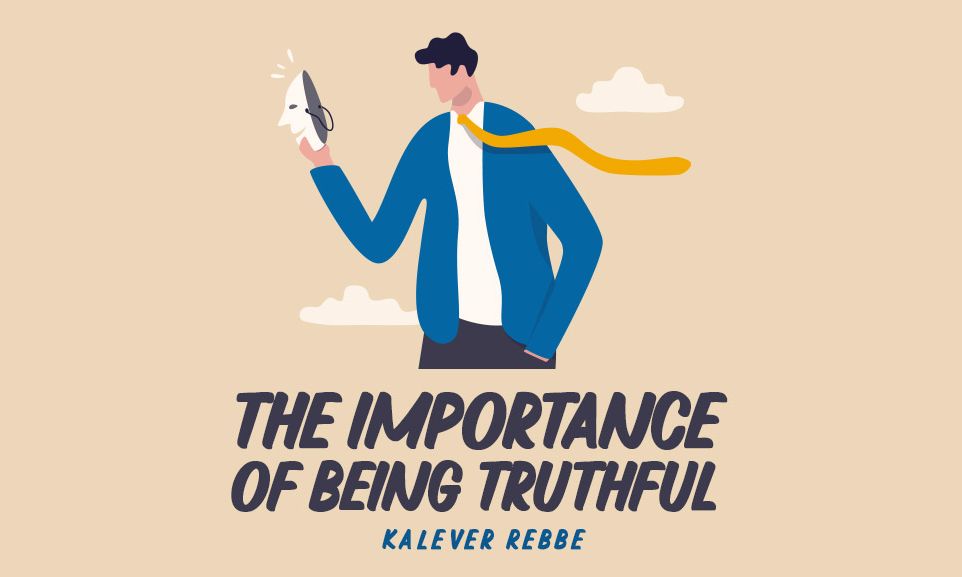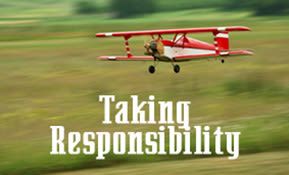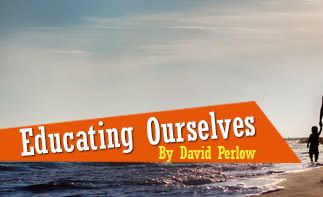
The Importance of Being Truthful
Do you want to protect and empower your child? Raise him to always tell the truth, to cherish honesty, and to embrace integrity.

“So build yourselves cities for your children and enclosures for your sheep, and what has proceeded from your mouth you shall do”. (Bamidbar 32:24)
Model Truth
Chazal (Succah 46b), while discussing the importance of being mindful about one’s speech, teaches that you should not ask a child to give you something that they are unable to give, because it teaches the child to lie.
Even though people are careful not to lie, they become less careful when speaking with children. When a child, for example, asks for something or has a question, adults will often reply without worrying about the honesty of their answer. They figure that the children won’t question the answer or worry much about its authenticity. And there are many times when an adult will promise a child something, and never fulfill that commitment.
Those empty promises teach a child through modeling. It teaches them that lying and deceit are acceptable, Heaven forbid, even if only under certain circumstances.
Therefore, Chazal specifically chose the example of a child to reinforce the idea that emet, truth and honesty, applies to all situations, all interactions, and at all times.
Deceit Runs Deep
Without realizing it, this behavior can undermine all the time and resources invested in a child’s education. It can set them on a path that distances themselves from Hashem and His Torah.
The posuk says, Distance yourself from a false matter; and do not kill a truly innocent person or one who has been declared innocent, for I will not vindicate a guilty person (Shemot 23:7). The Baal Shem Tov taught (Menorat Zaav Parshat Misphatim) that a “false matter” – a lie – will “distance yourself” from Hashem.
It is impossible to always watch your children. You can enroll them in the best schools. You can create healthy boundaries and safeguards to keep them spiritually and physically safe. However, you simply cannot oversee them all the time.
And, if they become accustomed to lying, if they have learned from your behaviors that deceit and dishonesty are acceptable in some circumstances, they will start to hide their behaviors from you, deceiving and misleading you. If you ask them where they were and what they were doing, they might lie to hide the truth. They begin to live a double life. They become like Eisav who lied to his father, Yitzchak Avinu, and led him to believe falsely that he was sitting in the “tents of learning”.
By the time the truth becomes known, it becomes extremely difficult to help them change their behavior and they continue to deteriorate spiritually, emotionally, and physically. Before long, their prospects for a happy and fulfilling life evaporate.
On the other hand, a child who is raised to always tell the truth, to cherish honesty and integrity, will overcome a nesyaon (test or challenge) simply because he is afraid that he will be asked about it later and be unable to lie and hide his shortcomings. His honesty will protect and empower him.
Teach Me One Thing
Sefer Chasidim (Siman 646) relates that a wicked person once asked a wise man, “Teach me one thing to do and I will do it even though it is difficult.” The wise man told him, “Never tell a lie.” The wicked person agreed, and whenever he was about to steal or do something wrong, he would refrain because he was constantly worried that he would be asked about it and be unable to lie, thus admitting his guilt. In short order, he had completely changed his wicked ways and became an upstanding yid.
A person must accustom himself and his children to always speak truthfully and avoid lying at all costs, even when the culture leads you to believe that it is a harmless, white lie.
The yidden have a commandment, a mitzvah, to avoid lying, therefore, it must be avoided like any other forbidden activity such as eating non-kosher etc.
Careful What Comes Out of Your Mouth
One time, the Yid HaKodesh from Peshischa told his disciple, the Rebbe R’ Bunim, and the other Chassidim that they should go on a journey without telling them where they were going or why.
When they reached their first destination, their host wanted to prepare a large meal in their honor. As the meal was being prepared and the Chassidim saw all the food and they began asking questions about the respectability of the kosher supervision: where did the meat come from, was it properly salted etc. Suddenly, the chef shouted from behind the stove, “Chassidim! Chassidim! You are being so careful about what you put into your mouths! Why aren’t you as careful about what comes out of your mouths!?”
The Chassidim immediately understood that their Rebbe sent them on this journey with the sole purpose of hearing this lesson, of hearing these words of mussar. They returned home more meticulous about how they spoke, adhering to words of truth and avoiding words of deceit and lies.
We Will Build Schools
We see this idea with the tribes of Gad and Reuven. They asked to remain east of the Jordan as their inheritance of Eretz Yisroel because that was where the best land was for pasturing their animals (see Bamidbar 32:1-4).
Realizing the impact of this request on the rest of the community, they approached Moshe Rabbeinu apologetically and committed themselves to ensuring that their children were properly educated as it says, “They approached him and said, “We will build sheepfolds for our livestock here and cities for our children.” (Bamidbar 34:16) They committed to raising the funds to build yeshivot and educational centers. They would build places in each city for the children to learn and connect to the Torah.
Build More than Schools
But that was not enough.
Moshe responds, “So build yourselves cities for your children and enclosures for your sheep, and what has proceeded from your mouth you shall do. (Bamidbar 32:24).
Moshe agreed to their commitment to build yeshivot and to prioritize the education of his children. But he adds one critical lesson, one requirement that is even more important: what has proceeded from your mouth you shall do.
Moshe was teaching them a lesson: speak truthfully. You are verbalizing an aspiration and making a commitment. You better fulfill it. Teach your children the power of truthfulness. That is a core element of education and modeling. Without it, the yeshivot will be useless and their education will be undermined.
***
The Kalever Rebbe is the seventh Rebbe of the Kaalov Chasidic dynasty, begun by his ancestor who was born to his previously childless parents after receiving a blessing from the Baal Shem Tov zy”a, and later learned under the Maggid of Mezeritch zt”l. The Rebbe has been involved in outreach for more than 30 years, and writes weekly emails on understanding current issues through the Torah. You can sign up at www.kaalov.org.











Tell us what you think!
Thank you for your comment!
It will be published after approval by the Editor.